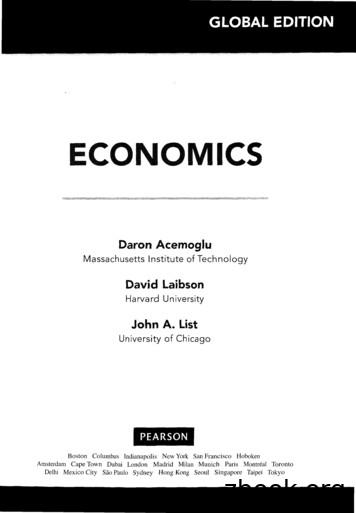Open Day Economics
Open DayEconomicsKamiar MohaddesFaculty of Economics@KamiarMohaddes
Why Study Economics? Economics analyses how people, firms andgovernments make decisions about scarceresources, including their interactions andaggregate consequences. Good economists “must be mathematician,historian, statesman, philosopher—insome degree. They must understandsymbols and speak in words. They mustcontemplate the particular in terms of thegeneral, and touch abstract and concrete inthe same flight of thought ”
Why Study Economics at Cambridge? The Faculty of Economics at Cambridge University has rootsgoing back to the 1890s. The contribution of Cambridge economics to the developmentand evolution of the discipline nationally and internationallyhas been profound and unique.
Cambridge Economists (just a few)Alfred Marshall(one of thefounders ofNeoclassicaleconomics)Joan Robinson(capital theory)James Meade(internationaleconomics)Nicholas Kaldor(increasing returnsand economicgrowthJames Mirrlees(taxation)Richard KahnJohn Maynard(multiplier theory) Keynes(General Theoryof Employment,Interest andMoney)
Eleven Nobel Prize Winners over the Last Half Century Kenneth J Arrow (Churchill College) and John Hicks (Gonville andCaius College): for the equilibrium theory Milton Friedman (Gonville and Caius College): for consumptionanalysis, monetary history and theory and the complexity of stabilizationpolicy. James Meade (Christ's and Trinity Colleges): for contributions to thetheory of international trade Gerard Debreu (Churchill College): for reforming the theory of generalequilibrium Richard Stone (Gonville and Caius College and Fellow of King'sCollege): for developing a national income accounting system
Eleven Nobel Prize Winners over the Last Half Century Robert Fogel (Pitt Professor of American History and Institutions): forhaving renewed research in economic history by applying economictheory and quantitative methods in order to explain economic andinstitutional change James Mirrlees (Trinity College): for studying behaviour in the absenceof complete information Amartya Sen (Trinity College): for his contributions to welfareeconomics Joseph Stiglitz (Gonville and Caius College): for analyses of marketswith asymmetric information Peter Diamond (Churchill College): for analysis of markets with searchfrictions
Why Study Economics at Cambridge? Well-rounded, rigorous education in Economics Providing students tools and insights to analyse and understandcomplex economic phenomena. Developing problem-solving and analytical skills, highly valued inbusiness, finance and public sector. Preparing for graduate study in Economics.
Prerequisites Economics Tripos Strong quantitative skills and proficiency in mathematics Maths (A-level, IB HL, or equivalent) required Further Maths (esp. Pure and Statistics) useful Intellectual curiosity to rigorously and critically analysewide range of economic issues Economics (A-level, IB HL, or equivalent) desirable(if not offered, could consider taking Geography or History instead) Strong overall academic record Strength in both model- and essay-based subjects(e.g. Physics and History) Typical successful applicant in previous years: at least 6 A* atGCSE, strong in Maths and doing (A-level) Further Maths
Admissions and Offers Competition for places is strong: around 6-7 applicants per place. Admissions done by Colleges, involving1) Two-hour admissions assessment.Section 1: Problem solving & Maths for Economics (80 mins)Section 2: Essay on topic of economic interest (40 mins).2) Interview in Cambridge (early Dec). Typical A-level offer conditional on achieving A*A*Afor ‘academic’ A-level subjects, with A* for Maths.For IB, 40-42 points with 776 at HL, incl 7 for Maths.
Economics Tripos at CambridgeThree-year BA Honours course in Economics, divided into Part I, Part IIAand Part IIB, with written exams at end of each year (no resits).Compulsory elements Microeconomics and Macroeconomics(in each year, with broad syllabus); Quantitative Methods (Mathematics &Statistics) and Econometrics; Political & Social Aspects of Economicsand Economic History; Dissertation (in Part IIB).Wide range of optional courses in Part IIA and IIB!Some possibilities for switching to other subjects, including:Human/Social/Political Sciences, History after Part IManagement Studies after Part IIA (subject to quota)
Part I of Economics TriposCommon first-year with fivecompulsory papersMicroeconomicsMacroeconomicsQuantitative Methods(Maths and Statistics)Political and Social Aspects ofEconomicsBritish Economic History
Part IIA of Economics TriposFour papers in second year, including three compulsory papersMicroeconomicsMacroeconomicsTheory and Practice of Econometricsand one option, currently chosen fromTrade & DevelopmentHistorical Perspectives on GrowthMathematics & StatisticsHistory & Philosophy of EconomicsLabour EconomicsCould also borrow papers from:Politics, Sociology, and International Relations
Part IIB of Economics Tripos (lots of choice!)Final year consists of five elements, including three ssertationand two options, currently chosen fromEconomic Theory and AnalysisDevelopment EconomicsBanking and FinancePublic EconomicsIndustryEconometricsPolitical EconomicsWorld Depression during Interwar Yearsor selected papers from Sociology and Politics
Teaching in Economics Tripos Academic year consists of three 8-week terms – intensive! Faculty of Economics provides: lectures (typically 32-40 hours per paper) examinations (typically 3-hour written exam for each paper) Colleges organise: small-group ‘supervisions’ (typically 10 hours per paper) tutorial support, housing and extracurricular activities admissions Lecturers provide supervision assignments to facilitate coordinationwith Colleges.
Careers After Economics TriposWide range of career opportunities! Business and finance, including Asset management Investment banking Economic/management consulting Public sector, including Bank of England Government Economic Service International organisations (e.g. IMF, World Bank, UN)Many economic careers require Master’s degree, for whichEconomics Tripos provides excellent preparation.
Part IIA of Economics Tripos Four papers in second year, including three compulsory papers Microeconomics Macroeconomics Theory and Practice of Econometrics and one option, currently chosen from Trade & Development Historical Perspectives on Growth Mathematics & Statistics History & Philosophy of Economics Labour Economics Could also borrow .
COUNTY Archery Season Firearms Season Muzzleloader Season Lands Open Sept. 13 Sept.20 Sept. 27 Oct. 4 Oct. 11 Oct. 18 Oct. 25 Nov. 1 Nov. 8 Nov. 15 Nov. 22 Jan. 3 Jan. 10 Jan. 17 Jan. 24 Nov. 15 (jJr. Hunt) Nov. 29 Dec. 6 Jan. 10 Dec. 20 Dec. 27 ALLEGANY Open Open Open Open Open Open Open Open Open Open Open Open Open Open Open Open Open Open .
Std. 12th Economics Smart Notes, Commerce and Arts (MH Board) Author: Target Publications Subject: Economics Keywords: economics notes class 12, 12th commerce, 12th economics book , 12th commerce books, class 12 economics book, maharashtra state board books for 12th, smart notes, 12th std economics book , 12th economics book maharashtra board, 12th economics guide , maharashtra hsc board .
International Finance 14. Development Policy 15. Institutional Economics 16. Financial Markets 17. Managerial Economics. 13 18. Political Economy 19. Industrial Economics 20. Transport Economics 21. Health Economics 22. Experimental and Behavioral Economics 23. Urban Economics 24. Regional Economics 25. Poverty and Income Distribution
ECONOMICS 40 Chapter 1: The Principles and Practica of Economics 40 1.1 The Scope of Economics 41 Economic Agents and Economic Resources 41 Definition of Economics 42 Positive Economics and Normative Economics 43 Microeconomics and Macroeconomics 44 1.2 Three Principles of Economics
Behavioral Economics Experimental Economics Macroeconomics and Public Sector Economics Monetary Policy Fiscal Policy Cost-Benefit Analysis Economics of Regulations and Competitive Economy Labour and Population Labour Economics Population Economics Human Resource Development Islamic Economics Islamic Banking: Theory and Practice
Mar 16, 2016 · CLEANSE DAY OPTIONS/SUPPORT: 2 Isagenix Snacks† . CLEANSING CALENDAR (START ON ANY DAY OF THE WEEK) Track Your Progress MEASUREMENT TRACKER S Day 1 S Day 2 S Day 3 S Day 4 S Day 5 S Day 6 C Day 7 S Day 8 S Day 9 S Day 10 S Day 11 S Day 12 S Day 13 C Day 14 S
CLEANSE DAY OPTIONS/SUPPORT: 2 Isagenix Snacks† . CLEANSING CALENDAR (START ON ANY DAY OF THE WEEK) Track Your Progress MEASUREMENT TRACKER S Day 1 S Day 2 S Day 3 S Day 4 S Day 5 S Day 6 C Day 7 S Day 8 Day 9 Day 10 Day 11 Day 12 Day 13 C Day 14 S
excess returns over the risk-free rate of each portfolio, and the excess returns of the long- . Journal of Financial Economics, Journal of Financial Markets Journal of Financial Economics. Journal of Financial Economics. Journal of Financial Economics Journal of Financial Economics Journal of Financial Economics Journal of Financial Economics .























